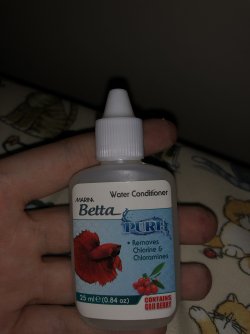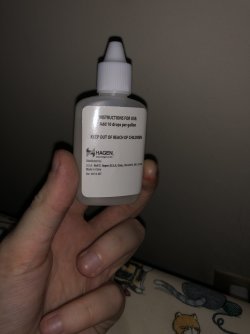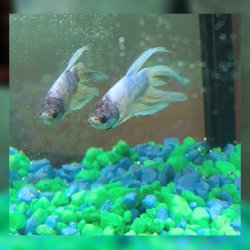KateeR
New Member
Hello, I got my first betta (Mr Fiji) yesterday, I'm new to owning fish and I'm a bit worried because he's spending most of his time at the top of his tank.
He was healthy when I got him (despite being kept in a tiny betta bowl): he had a bubble nest going and no fin or tail rot, and yesterday when I brought him home he did swim around quite a bit but now he's mostly stopped.
He can swim just fine, because if I move the lid he gets spooked at darts away, so it's not a swim bladder issue or anything like that.
He has a floating log and two artificial plants so he does have hiding spots and things to entertain him.
His tank is a standard rectangular 5 gal. tank with a filter on very low, a heater keeping the water 79 degrees F, and a ventilated lid with a LED light.
Is it possible he's still just nervous and getting used to his new habitat? Or maybe he's jut lethargic from not eating? I'm very worried about him because as soon as I brought him home I fell in love.
I do have two concerns:
A) I'm worried that I may have over-treated the tap water (if that's such a thing). The bottle I used says to add 10 drops per gallon, but when I started adding drops they came out two or three at a time.
B) I'm worried maybe he doesn't have enough space at the top of his tank. He has about 3.5/4 cm of air space from the surface of the water to the lid. I wanted to give him more space but the thermometer I got had a water line indicator that was pretty high.
If someone could help me out that'd be great, thanks so much
He was healthy when I got him (despite being kept in a tiny betta bowl): he had a bubble nest going and no fin or tail rot, and yesterday when I brought him home he did swim around quite a bit but now he's mostly stopped.
He can swim just fine, because if I move the lid he gets spooked at darts away, so it's not a swim bladder issue or anything like that.
He has a floating log and two artificial plants so he does have hiding spots and things to entertain him.
His tank is a standard rectangular 5 gal. tank with a filter on very low, a heater keeping the water 79 degrees F, and a ventilated lid with a LED light.
Is it possible he's still just nervous and getting used to his new habitat? Or maybe he's jut lethargic from not eating? I'm very worried about him because as soon as I brought him home I fell in love.
I do have two concerns:
A) I'm worried that I may have over-treated the tap water (if that's such a thing). The bottle I used says to add 10 drops per gallon, but when I started adding drops they came out two or three at a time.
B) I'm worried maybe he doesn't have enough space at the top of his tank. He has about 3.5/4 cm of air space from the surface of the water to the lid. I wanted to give him more space but the thermometer I got had a water line indicator that was pretty high.
If someone could help me out that'd be great, thanks so much






